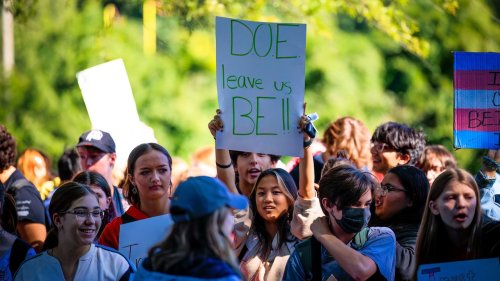By Aaron Miller-
Thousands of Virginia high school students walked out of school on Tuesday to protest proposed guidelines put forward by Governor Glenn Youngkin that would restrict protections for transgender students.
Students from nearly 100 high schools staged walkouts across the state to protest against the new policies, holding signs criticizing the guidelines, and waving pride flags in support of their LGBTQ+ peers.
The walkouts were organized by the Pride Liberation Project, a Virginia LGBTQ2S+ youth-led advocacy group, which lists more than 90 middle and high schools as participating. Walkouts happened throughout the day, with the earliest starting at 7 a.m. at schools in Culpeper County, and the latest at 3 p.m. at Longwood University.
Under the new model policies, all students would be forced to ask for parental permission in order to use different names and pronouns at school, as well as other aspects of “social transition.” Although the document did not define “social transition,” that process can entail actions as simple as changing one’s hair or clothing.
The proposal states that a student’s legal name and sex could not be changed without an official “legal document” or “court order,” adding that teachers and other school officials must “refer to each student using only the pronouns appropriate to the sex appearing in the student’s official record.” Transgender students would also be forced to use school facilities that match the sex assigned to them at birth.
The policies would also require schools to “keep parents informed” about matters relating to “their child’s health, and social and psychological development” — wording so vague that it could potentially be used as justification for policies that could force school employees to out students to their parents.
Re-instatement of the 2021 Model Policies, which protected trans students from discrimination and harassment, allowed trans students to self-identify in their school records, shielded student privacy, and allowed trans students to participate in the appropriate gender-segregated activities, like sports. In addition to that, Calabia advocated for further clauses that would allow students to self-determine their identities at school.
However, the new policies are very specific in their guidelines, and do not allow trans students to self-identify in their school records. The Pride Liberation Project plans to host rallies at school board meetings in counties across the state in the coming week.
Students participating in one walkout carried picket signs and Pride flags and chanted “Trans rights are human rights,” and “D-O-E (Department of Education), leave us be,” according to the Associated Press.
The action came in response to new policies announced earlier this month by Republican Gov. Glenn Youngkin’s administration, which students say target trans students’ rights in schools. Students and parents would have to file legal documents to change names and pronouns, and trans students would also be banned from using restrooms and locker rooms based on their gender.
“We decided to hold these walkouts as kind of a way to … disrupt schools and have students be aware of what’s going on,” said high school senior Natasha Sanghvi to NBC Washington. Sanghvi is part of Pride Liberation Project, a statewide LGBTQ advocacy group that helped organize the walkouts.
Lauren Truong, 16, who led dozens of her schoolmates in a walkout, said several LGBTQ+ students she knows are fearful of how the new policies could affect them. “We want our school districts to stand up for us and support us and say that they’ll reject these guidelines,” Truong told the Washington Post.
Controversies surrounding transgenders issues have been a longstanding issue in the U.S for years.
On 17 September, the Virginia department of education announced several rewritten policies affecting transgender students in classrooms. The policy reversals, which are currently under 30-day public comment period, would require students to use school facilities that match their biological sex and make it more difficult for students to change names and gender pronouns by requiring parents to give their approval for students who are minors.
Advocates say the new policies are transphobic and risk the health and safety of transgender students, who could be outed to their parents.
They also say the suggested policies are especially difficult for students who had grown used to protections established under the administration of former governor Ralph Northam, a Democrat.
Several students at the protest expressed their fear and disappointment at how the new policies could affect them and their peers.
Particularly vocal was high school senior Casey Calabia, who is non-binary, told a local news station of Youngkin and the proposed guidelines: “I am scared of this man. My friends are scared of this man. How can he stand there and say he loves this country and loves this state if he wants to hurt us?”
Calabia said they had experienced being misgendered and bullied at their previous school before transferring to a more inclusive environment. They worry about how the policies and increased intolerance could affect the mental health of transgender students.
“I nearly committed suicide. These are really kids who are scared out of their minds because of this policy,” Calabia said.
Students also decried the political nature of the proposed rollbacks, especially as Republican politicians continue to advance policies that target LGBTQ+ students in and outside of the classroom.
“These revised guidelines will only hurt students in a time when students are facing unparalleled mental health challenges and are a cruel attempt to politicize the existence of LGBTQIA+ students for political gain,” said Pride Liberation Project in a statement.
Legal experts say the governor’s guidelines can still be legally challenged, and expect a catalogue of litigations to follow if the law remains unchanged after the comment period expires.

